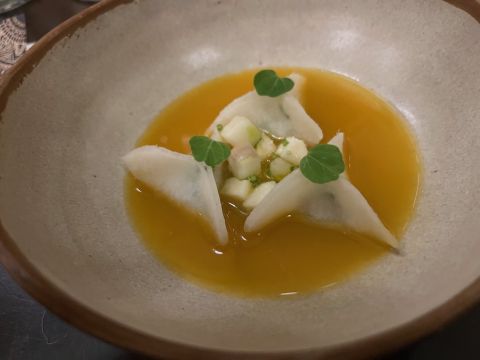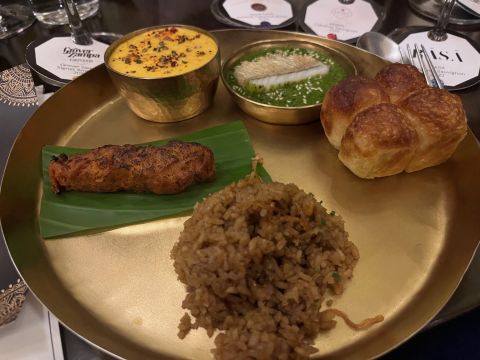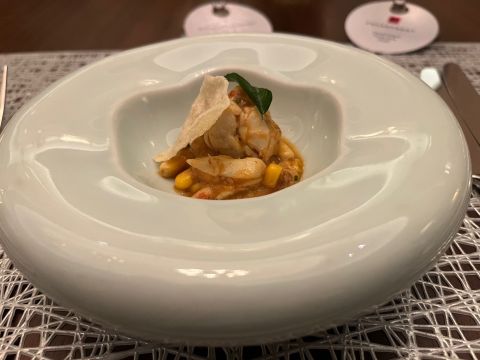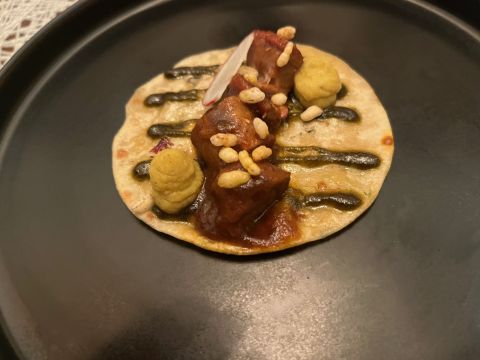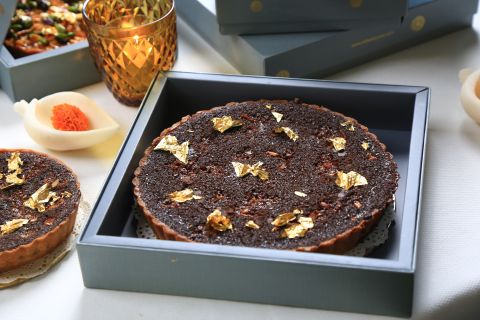Two more great restaurants in India

Nick describes two more very different but equally remarkable restaurants in Mumbai. See also Three great vegetarian meals in India.
I have enjoyed and hosted enough wine dinners to fully appreciate that they are full of surprises. One recurring nightmare is whether there will be enough of the oldest wine in the best possible condition? I still remember this vividly from a Bordeaux wine dinner that I arranged in 1985 or 1986 hosted by the late Edmund Penning-Rowsell. He had chosen a Château Montrose 1961 as the final wine for the 50 guests and everything happily turned out just fine and the Montrose was fabulous but it was a big cause for concern for me beforehand.
Fortunately, over the space of 48 hours in India’s liveliest city recently I was merely a guest at two wine dinners where the restaurateurs, chefs and sommeliers knew far more than I did. And their composite knowledge was fully vindicated.
These two dinners took place in very different restaurants in Mumbai. And while both restaurants are driven by the same principles – to offer modern, ingredient-led, very high-quality Indian dishes, wine and service – they do so in particularly varied locations.
Masque, about which Jancis wrote yesterday, is located in one of the city’s old textile mills in Mumbai’s grungy equivalent of Brooklyn or Shoreditch, a relationship that is referred to twice in their address, and is overwhelmingly black on the exterior and interior, a fact which has not hindered its meteoric rise. It was opened in 2016 by the elegant Aditi Dugar, since joined by her husband, entrepreneur Aditya, and today is best known for its 10-course tasting menu which sells for 5,950 rupees per person, the equivalent of a little over £53.
With a kitchen geared to serving only a tasting menu, the organiser of our dinner began with a definite advantage, but still faced numerous challenges. She had invited nine of the top wine producers across India to attend and each of them had been asked to present one wine and to talk about it in two minutes maximum. Each had also to dress in Indian costume – as did we! The organiser Sonal Holland MW had justifiably given the evening the title Navratna, the nine gems.
Our evening began with a glass of Chandon Brut Rosé and three ‘pass arounds’, of which one was a terrific duck sevai tart, pieces of duck with vermicelli, which was followed by three delicate momos made from jicama and a glass of Big Banyan Viognier.
The third course had me baffled: how could sweet potato taste so much like pork, I wondered? It was my kind neighbour who pointed out to me that I was inadvertently looking at the vegetarian menu rather than the non-vegetarian (as in all serious Indian restaurants, there are both, served simultaneously). This was served with two reds, a 2019 Grover Zampa Signet made in amphora and a 2023 Good Earth Antaraa Cabernet/Shiraz.
The kitchen then made two unforced errors. The first was serving a fillet of delicate ladyfish, a pike-like fish, on the same plate as a sturdy serving of lamb bhutwa, lamb fried in Himalayan spices, and ladi pao, an Indian bread that I could eat night and day. They then, as did the second restaurant, served an unnecessary sorbet, at almost the same time as two hearty reds, 2022 Rāsā Cabernet Sauvignon and 2019 KRSMA Cabernet.
The location of the recently opened Indian Accent in Mumbai (main picture above) could not be more different. It has opened on the ground floor of the Nita Mukesh Ambani Cultural Centre in the Jio World Centre in Mumbai’s commercial hub, Bandra-Kurla Complex. (So bad was the traffic that it took us 1 hour 45 minutes to get there from the Taj Mahal Palace hotel by the Gateway of India.) There is not a touch of black anywhere: the place seems to glisten with marble, glass and polished steel. It is a building that makes a very strong statement about the current prosperity of India.
The small restaurant group – Mumbai is their third restaurant after New Delhi and New York (their London branch closed, sadly) – shows great attention to detail. Both here and at Masque, what is inside the restaurant’s front door perfectly matches what is on the outside.
We were shown to a private room set for 20 as we were the last to arrive, to join a room of locals both hungry and thirsty. Laurent-Perrier came to the rescue.
There were fewer wines at this dinner: two from Antinori, their 2020 Chianti Classico Badia a Passignano and their invariably delicious Cervaro della Sala 2022 as well as a 2019 Shiraz, The Struie from Torbreck in the Barossa. Also it was virtually impossible to get away from the presence of their head chef, Rijul Gulati, of whom I assume there is only one. But whenever I looked up from my food there was Gulati: serving, explaining, cajoling, laughing with customers and always smiling.
As well he might at the quality of the food. Kanyakumari crab from Tamil Nadu with monsoon corn (above); an Indian taco of bihari tash (diced mutton) with bhunja (puffed grains) and ole chutney (mustard laced with yams) shown below; a fillet of sea bass flavoured with gongura, a variety of the roselle plant; and of course, their kulcha, homemade pitta bread that I had the greatest difficulty in not finishing entirely.
And as we left, general manager Kevin Rodrigues presented us with a boxed gift which fortunately survived the nine hours next to my shoes in the overhead compartment of our BA flight back to London. It turned out to be the most delicious Indian version of a treacle tart, much appreciated by our family.
At the end of the dinner at Masque, I had been asked to say a few words about the food. Conscious of the many speeches the audience had already suffered, I was brief and thanked those whose job was just about to begin, those responsible for washing the many wine glasses.
What I also inferred is that putting on a wine dinner is a true test of any restaurant’s team spirit. Everyone, not least the plongeurs, has to be at their best. So a huge thank you, as well as my compliments, to all at Masque and Indian Accent.
Warm Doda Barfi-Treacle Tart
Inspired by Chef Manish Mehrotra who sends these words
Doda barfi, a sweet with a grainy, fudge-like texture, is not very popular, except during Diwali when it is included in the boxes of sweets that are distributed among friends, colleagues and family. A piece of doda barfi warmed in the microwave and served with a drizzle of cream or a scoop of vanilla ice cream is usually how I eat it.
Creating a dessert using doda barfi which everyone would like was a challenge. Living in London in 2007–08, I was reminded of doda barfi when I ate a Sainsbury's treacle tart for the first time, and inspiration struck. When customers ask the staff to recommend a dessert, and we offer doda barfi-treacle tart, most of them tend to be wary. However, once they taste it, they become converts, making doda barfi-treacle tart the highest selling dessert at Indian Accent.
Ingredients
For tart shell:
- 5 tbsp butter
- 3½ tbsp castor sugar
- 1 egg
- 150 g refined flour
For chocolate sponge cake (a 400-g cake):
- 7 eggs
- 180 g sugar
- 150 g refined flour
- 35 g cocoa powder
- ½ tsp baking powder
For tart filling:
- 5 tbsp unsalted butter
- 280 g golden syrup
- 2 tbsp single cream
- 1 egg
- 4 tbsp crumbled chocolate sponge cake
- 5 tbsp crumbled doda barfi
For serving:
- Vanilla ice cream (1 scoop per slice)
To prepare the tart shells:
The day before serving, whip the butter and sugar until soft and smooth. Add the egg. Mix until fluffy. Fold the mixture gently in the flour. Avoid over-mixing. Knead the mixture into a soft dough. Chill the dough overnight in the fridge (not the freezer).
When ready to cook, preheat the oven to 180 °C. Prepare a 9-inch flan/tart mould and line it with the chilled, hardened dough. Blind bake (filling the shells with beans or metal coins to retain the hollow tart shape) for 15 minutes, until the dough is half-baked. Remove the baking weights. Bake for a further 8 minutes until the pastry is light golden brown. Remove from oven and let cool in the mould.
To prepare the chocolate sponge cake:
Whisk eggs and sugar together until the mixture is foamy and pale in colour. Sift the flour, cocoa powder and baking powder together. Gently fold it into the egg-and-sugar mixture.
Preheat the oven to 200 °C. Prepare a cake pan. Pour the cake mixture into the pan. Bake in a preheated oven at 200 °C for 25 minutes. A toothpick inserted through the centre of the cake should come out clean when the cake is fully done.
To prepare the filling:
Heat butter in a saucepan on a low flame until it melts and turns light brown in colour. Add the golden syrup. Mix well and remove. Stir in the cream and egg. Crumble the chocolate sponge cake and add 4 tbsp; also add the crumbled doda barfi. Mix well.
To bake and serve the tart:
Fill the prepared tart shell with the mixture and bake the tart in a preheated oven at 170 °C for 40 minutes. Remove from oven and allow to cool a bit before slicing. Serve each slice with a scoop of vanilla ice cream.
Masque Unit G3, Laxmi Woollen Mills, Shakti Mills Lane, off Dr Elijah Moses Rd, Mahalaxmi, Mumbai, India 400011; tel: +91 98 1906 9222
Indian Accent Ground floor, Nita Mukesh Ambani Cultural Centre, Jio World Centre, BKC, Mumbai, India 40098; tel: +91 22 3525 1500
Every Sunday, Nick writes about restaurants. To stay abreast of his reviews, sign up for our weekly newsletter.
Become a member to view this article and thousands more!
- 15,414 featured articles
- 275,126 wine reviews
- Maps from The World Atlas of Wine, 8th edition (RRP £50)
- The Oxford Companion to Wine, 5th edition (RRP £50)
- Members’ forum
- 15,414 featured articles
- 275,126 wine reviews
- Maps from The World Atlas of Wine, 8th edition (RRP £50)
- The Oxford Companion to Wine, 5th edition (RRP £50)
- Members’ forum
- 48-hour preview of all scheduled articles
- Commercial use of our wine reviews

